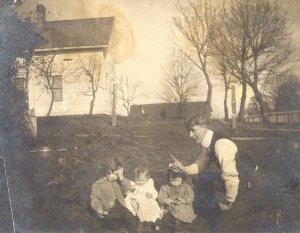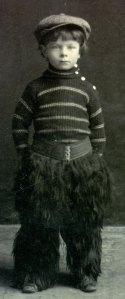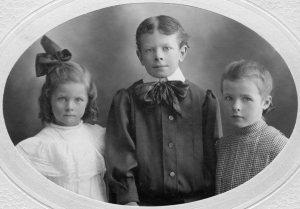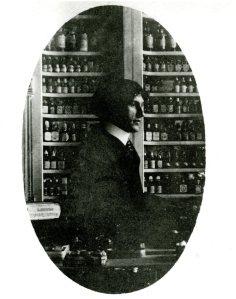
Herman Pauling with his three children in Salem, Oregon, where the family briefly lived.
(Part 2 of 2)
His family settled in Salem but not happy about it, it did not take long for Herman Pauling to look for new employment opportunitiess, and in March 1905 he traveled to Portland to explore the possibility of opening a drugstore. After visiting the Skidmore Drug Company, his old employer, and deciding that Portland was not going to work out, Herman once again set his sights on Condon.
With the help of Belle’s brother-in-law, Herbert Stephenson, Herman was able to locate a storefront and a place for his family to live. The logistics settled, Herman wrote to Belle back in Salem, asking her to come join him so that they could start their life anew. Herman’s letter also revealed a deeper motivation behind his relentless work ethic:
We cannot imagine what it is but I feel that either ourselves or our children will someday stand before the world as a specimen of a high standard of intelligence.

Linus Pauling, a Condon Cowboy at age 5.
Condon was in the midst of an economic boom when the Paulings came to town. The Northern Pacific Railroad had built a spur to Condon to help connect the area’s abundant wheat harvests with the rest of the country. The town’s favorable economic conditions helped the population to grow and, being the only druggist in town, Herman benefited from the rising tide. He brought his store to the town’s attention by placing large ads in the weekly Globe newspaper, announcing products like “Pauling’s Pink Pills for Paling,” “Pauling’s Improved Blood Purifier,” and “Pauling’s Barb Wire Cure.” Herman also sold postcards featuring his son, Linus, dressed up and captioned: “A Condon Cowboy.”
Condon brought its challenges as well. The summer heat was hard on Herman and Belle too had also grown accustomed to the milder summer of the Willamette Valley. To escape the heat, Belle and the children would travel to Oswego for long stays with Herman’s parents, while Herman himself stayed behind to manage the store. By his second summer in Condon, Herman began conjuring up ideas for how he could get out of eastern Oregon, but it took a few years and more struggles before that would come to pass.

Promotional calendar offered by H.W. Pauling, druggist. 1907.
The financial panic of 1907 reached out from Wall Street to all corners of the country, including Condon, and it made a negative impact on Herman’s business. To help shore up his income, Herman partnered with a jeweler who promptly died the following year, leaving Herman to take over his role while also expanding into other areas, like selling eyeglasses. Herman’s associations through his many fellowship organizations, including Woodmen of the World and the Odd Fellows, helped to keep the drugstore profitable both through and after the panic, but staying afloat did not come easy.
Combined with his continuing need to engage in business travel, Herman’s long hours at work brought more and more pressure on his marriage. Belle was outspoken about her disappointment in Herman, while Herman tried to do what he could to keep their problems out of the range of the children. In one letter, Herman let out what he had been holding back.
I have quite enough to worry me without asking you to peck, peck, peck at me. But I guess you cannot help it, as that blessing is characteristic of the Darling family… Were it not for trying to get a start financially so you and the little ones may live in an abbreviated form of luxury in later years, I would not stay in this God forsaken hole a moment. You have discouraged me so often in my efforts that I would think you would eventually come to a conclusion to encourage me a little by discontinuing your nonsensical jealousy.
Ground down by the pressures of life, Herman’s health began to suffer. He developed insomnia and what he described as a “tummick ake,” a condition that would sometimes incapacitate him, leaving him bedridden. More often that not however, his stomach problems could be soothed simply by eating something. Armed with an easy method for treating his symptoms, he pushed along as best as he could.

The Pauling children, 1908.
Though he was unable to spend much time with them, Herman adored his children and sought to be the best possible role model, always hoping that they would grow up to be “an asset to the human race.” He brought his son to work with him and Linus maintained memories of watching his father concoct various medicines, using careful measurements while also testing the compounds through various chemical reactions.
Herman also looked after Linus, who could get into trouble when he was not at home or in his father’s store. One day Linus was exploring a building that was in the process of being constructed. One of the workmen saw him there and was angered. Linus tried to climb out the window, but the workman caught him before he could escape and ended up giving the young boy a beating.
When Linus came crying to his father, Herman immediately went out, found the workman, and punched him to the ground. As Linus later remembered, his father was arrested soon afterwards. Though Linus had associated his father’s arrest with assaulting the workman, according to biographer Thomas Hager, the arrest was more likely tied to charges of bootlegging that had been levied against Herman. (He was eventually cleared of any wrongdoing.)
While most of the town appreciated Herman, some locals felt otherwise. After Herman had organized a Fourth of July celebration and run advertisements in the program for the day’s baseball game, the other jeweler in town wrote a letter to the editor of the Globe, attacking his competitor for his advertising tactics. Herman did not stand for this public affront and retaliated by writing a lengthy response, titled “The Truth Will Out,” that described how “Sorehead Charlie” was being unfair and that, in business, having enemies is helpful, but not at the cost of fair play. The exchange went on for several weeks until both sides eventually calmed down.
As time passed, Herman and Belle became increasingly eager to get out of Condon. Herman did not like dealing with the recurrent diphtheria and whooping cough which a few of the area’s children. Belle, as had been the case since they first married, wanted Herman to work less, frequently complaining about his work schedule, which often ran to fourteen hours per day. In early 1909, the final catalyst for a move came about in an unexpected fashion, when Herman’s store caught fire. The local firefighters who responded to the blaze wound up causing even more damage by breaking the store’s front window and the glass figures that were on display. Badly shaken, Herman focused intently on relocating and, by the fall, had saved enough money to move his family to Portland.

Back in the big city, Herman spent some time at the Skidmore Drug Company before opening up a new store on the growing east side of town. In Portland, Herman took a different approach and got out of most of the extra lines of merchandise that he had sold in Condon – jewelry, phonographs and the like. He did, however, add a soda fountain.
But business was slow. Herman kept himself occupied by taking up German – Belle had been enrolled in classes at the local high school, and Herman thought it would be fun to join her as she learned. It was also something to make him look busy when customers came in.
Herman likewise continued to encourage Linus’s growing curiosity by teaching him Latin to help supplement his budding interest in ancient civilizations. In May 1910, Herman also wrote to the editor of The Oregonian asking for advice about books to provide for his nine-year old son’s new interests. The editor responded by suggesting Plutarch, Herodotus, and Thomas Arnold’s The History of Rome.
Sadly, Herman did not have much time to follow up on the suggestions. On June 11, while the rest of the family, along with Belle’s sisters, were at the Portland Rose Festival, Herman was back working when he started to get one of his stomach aches. He went home and ate some of the roast that Belle had prepared for dinner which, as usual, helped to settle his stomach and allowed him to return to the store.
But the pain quickly returned and ferociously so. Herman collapsed and had to be carried home where he lay until his family arrived. After seeing his wife, son and daughters one last time, Herman soon passed away, leaving Belle to care for their three young children. He died at the age of 34, the victim of a perforated ulcer and attendant peritonitis.
About these ads